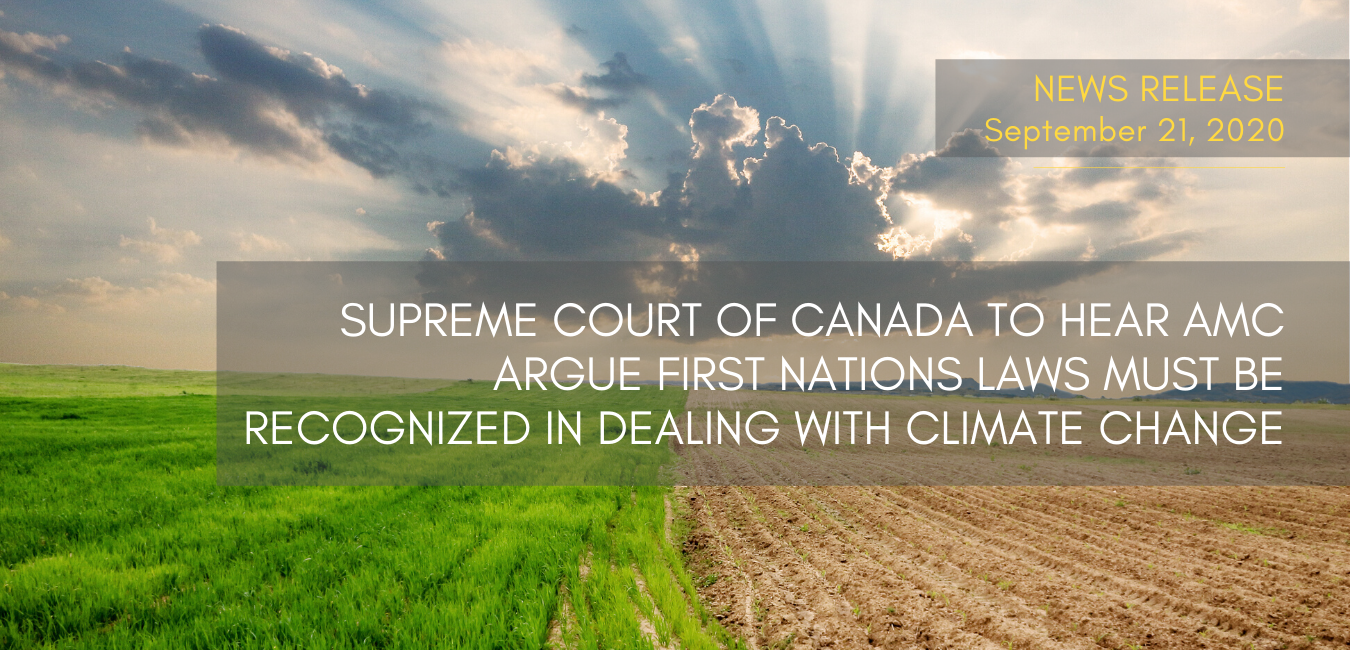Supreme Court of Canada to hear AMC argue First Nations laws must be recognized in dealing with climate change

September 21, 2020
Treaty One Territory, Manitoba
alexpapineau
Treaty One Territory, Winnipeg, Manitoba – On September 22 and 23, 2020, the Assembly of Manitoba Chiefs (AMC) will be intervening at the Supreme Court of Canada (SCC) in a significant and potentially transformational hearing. AMC is the only Intervenor to argue that First Nation constitutional orders are distinct but equal to Euro-Canadian laws.
Due to COVID-19, the hearing is being held both in person and virtually and will be webcast live at: https://www.scc-csc.ca/home-accueil/index-eng.aspx
On the surface, the case is about the Greenhouse Gas Pollution Pricing Act, the federal government’s carbon tax, and whether it intrudes on provincial jurisdiction. The Act was dealt a blow on Monday, February 24, 2020 when the Court of Appeal of Alberta ruled that the carbon tax is unconstitutional, on the grounds that it intrudes on provincial jurisdiction.
However, neither the federal nor provincial governments acknowledge the existence of First Nations laws. The AMC, represented by the Public Interest Law Centre (PILC), will argue that the Supreme Court has a unique opportunity to address a much deeper reality.
The Court will address the most fundamental constitutional question of our time – the means of addressing climate change. The AMC will propose an analysis, which must recognize the existence of First Nations constitutional orders. The AMC cautions against the incorporation of First Nations laws within the existing Euro-Canadian federalism analysis to address the constitutional question. Instead, the AMC proposes a return to the relationship as it was originally intended by Treaties – one between equal nations with distinct legal traditions.
There is confusion on the ground, and as a result Canada has witnessed protests, blockades, and police actions as First Nations, land protectors and corporate interests battle over control of natural resources and development.
AMC Grand Chief Arlen Dumas said, “First Nations people and laws have always been here. These laws continue to govern First Nations’ relationships with the Creator, Mother Earth and all living beings. They are grounded in mutual respect and underpin the Treaty relationship. Our First Nations laws constitute Canada’s first constitutional order, alongside the French Civil Law and English Common Law. This is a constitutional debate that must acknowledge our nation-to-nation relationships and help frame reconciliation.”
The AMC contends that this court case exposes an outdated, inaccurate and destructive narrative about Canada. First Nations laws have been recognized by the Supreme Court, however recent lower court decisions have sent contradictory signals about the relationship between Euro-Canadian laws and First Nations laws. This lack of clarity has led to a patchwork of inconsistent decisions.
“This court case offers an opportunity for a fundamental paradigm shift in the relationship between First Nations and non-First Nations people,” says Joëlle Pastora Sala, PILC attorney, who will argue at the Supreme Court via Zoom from Winnipeg. “We can create a more meaningful implementation of reconciliation – grounded in the spirit and intentions of treaties. Reconciliation, as outlined in the Truth and Reconciliation Commission’s Calls to Action, requires respect for First Nations laws as equal and distinct from Euro-Canadian laws. The Supreme Court has a key role to play in shaping the path forward.”
Canada is a full supporter of the United Nations Declaration on the Rights of Indigenous Peoples, which protects the right of First Nations to distinct legal institutions. According to First Nations Knowledge Keepers, the original intent of the treaty relationship was based on a mutual understanding of respect and responsibility. Looking at the climate crisis through a reconciliation lens requires acknowledging that both settler and First Nations worldviews and laws can meaningfully inform contemporary policy.
“Now more than ever, we must work together,” said Grand Chief Dumas, concluding, “First Nations laws can no longer be excluded. The future of all our children and the health of our planet is at stake. The crisis of climate change, like all contemporary challenges, is too complex for one treaty partner and one legal tradition. It is our sincere hope that the Supreme Court recognizes that First Nations laws can assist in alleviating the tension and restore environmental and constitutional balance.”